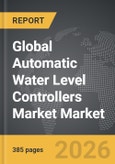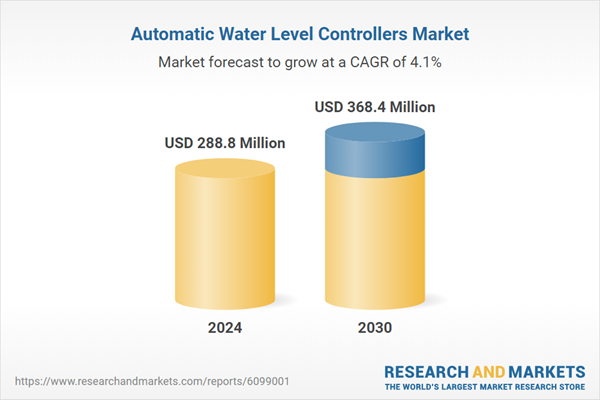Global Automatic Water Level Controllers Market - Key Trends & Drivers Summarized
Why Are Automatic Water Level Controllers Becoming Essential for Efficient Water Resource Management Across Sectors?
Automatic water level controllers are witnessing robust adoption across residential, commercial, agricultural, and industrial sectors as water scarcity, rising utility costs, and infrastructure modernization drive demand for smart, resource-efficient technologies. These systems automate the regulation of water levels in storage tanks, sumps, overhead reservoirs, and borewells by using sensor-based detection and relay mechanisms to switch pumps on or off based on real-time water levels. In an era where water availability is increasingly erratic due to climate change and urban expansion, automatic controllers play a pivotal role in conserving water, reducing pump run-time, and preventing both overflows and dry runs that lead to equipment wear and resource wastage.In high-density urban areas and smart buildings, these controllers are increasingly embedded within broader building management systems (BMS) to enable centralized control of water infrastructure. In rural and agricultural applications, they offer farmers the ability to maintain consistent irrigation cycles while minimizing manual labor and power usage - especially valuable in off-grid or solar-powered contexts. As energy efficiency, water conservation, and labor optimization become top priorities, automatic water level controllers are evolving from optional enhancements to critical components of modern fluid management ecosystems.
How Are Advancements in Sensor Technologies, IoT Integration, and Smart Pumping Systems Reshaping Controller Capabilities?
Technological upgrades in sensing, connectivity, and intelligent control are transforming the performance and scope of automatic water level controllers. Capacitive, ultrasonic, and pressure-based sensors are replacing traditional float switches to enable more precise and durable measurement in varied environments - including high-temperature, chemically reactive, or particulate-laden water. Controllers now feature microcontroller or PLC-based logic that allows real-time decision-making, adaptive threshold setting, and fault detection for situations like airlocks, sensor fouling, or electrical overloads.Integration with IoT platforms enables remote monitoring and control via mobile apps, dashboards, or SMS alerts - enhancing visibility into water usage patterns and system health, particularly in commercial buildings, industrial plants, and decentralized municipal supply networks. Smart controllers are increasingly paired with variable frequency drive (VFD) pumps and solar pumping systems to achieve energy-efficient, load-adaptive operation, further expanding their relevance in sustainability-focused applications. Firmware updates, data logging, and cloud storage capabilities are also extending product lifecycles and aligning water level controllers with broader smart utility and smart agriculture trends.
Where Is Demand for Automatic Water Level Controllers Accelerating and What End-Use Segments Are Leading Deployment?
Demand is rising sharply in urban infrastructure, multi-residential housing, and commercial property management, where efficient water use and leakage prevention are mandated by regulation or driven by sustainability targets. In rapidly urbanizing regions such as South Asia, Southeast Asia, and parts of Africa, municipalities are promoting these systems as part of decentralized water management efforts aimed at reducing strain on centralized infrastructure and avoiding non-revenue water loss. In residential applications, increasing consumer awareness and smart home adoption are accelerating integration with home automation systems that allow users to monitor and manage water systems alongside lighting, HVAC, and security.In agriculture, water level controllers are being integrated into smart irrigation setups to automate borewell pumping, canal filling, and water tank replenishment. Government incentives for water-saving technologies, especially in water-stressed regions, are fueling uptake. Industrial sectors - including chemicals, food processing, and textiles - are also deploying these controllers for process water and effluent management, where precision, automation, and environmental compliance are critical. In particular, factories adhering to ESG benchmarks and green certification requirements are mandating such systems as part of sustainable operations frameworks.
What Is Driving the Global Growth of the Automatic Water Level Controllers Market?
The expansion of the automatic water level controllers market is being powered by a global imperative for sustainable water management, along with ongoing infrastructure digitization and increasing adoption of smart utility technologies. Rising water tariffs, stricter building codes, and the growing penetration of IoT across facility systems are reinforcing the need for intelligent, autonomous control solutions. In regions with aging water infrastructure, these controllers offer a low-cost retrofit option to reduce operational inefficiencies and extend system life without full-scale replacements.Product innovations - such as wireless sensor networks, energy-harvesting circuits, and AI-assisted flow pattern analysis - are adding depth to the market and opening new use cases. Manufacturers are also focusing on modular, scalable designs suitable for both small-scale residential tanks and large-scale industrial reservoirs, expanding the total addressable market. As water becomes an increasingly contested and regulated resource, the question shaping future investments is clear: Can automatic water level controllers evolve into integrated water intelligence platforms that not only automate control but also provide predictive insight, regulatory reporting, and ecosystem-wide water stewardship?
Report Scope
The report analyzes the Automatic Water Level Controllers market, presented in terms of market value (US$). The analysis covers the key segments and geographic regions outlined below:- Segments: Product Type (Float-Operated, Ultrasonic, Capacitive, Pressure-based, Other Product Types); Application (Residential, Commercial, Industrial, Agricultural); End-User (Homeowners, Property Managers, Industrial Facilities, Farmers & Agricultural Businesses, Other End-Users).
- Geographic Regions/Countries: World; United States; Canada; Japan; China; Europe (France; Germany; Italy; United Kingdom; Spain; Russia; and Rest of Europe); Asia-Pacific (Australia; India; South Korea; and Rest of Asia-Pacific); Latin America (Argentina; Brazil; Mexico; and Rest of Latin America); Middle East (Iran; Israel; Saudi Arabia; United Arab Emirates; and Rest of Middle East); and Africa.
Key Insights:
- Market Growth: Understand the significant growth trajectory of the Float-Operated Controllers segment, which is expected to reach US$144.7 Million by 2030 with a CAGR of a 5%. The Ultrasonic Controllers segment is also set to grow at 4.6% CAGR over the analysis period.
- Regional Analysis: Gain insights into the U.S. market, valued at $78.7 Million in 2024, and China, forecasted to grow at an impressive 7.7% CAGR to reach $75.8 Million by 2030. Discover growth trends in other key regions, including Japan, Canada, Germany, and the Asia-Pacific.
Why You Should Buy This Report:
- Detailed Market Analysis: Access a thorough analysis of the Global Automatic Water Level Controllers Market, covering all major geographic regions and market segments.
- Competitive Insights: Get an overview of the competitive landscape, including the market presence of major players across different geographies.
- Future Trends and Drivers: Understand the key trends and drivers shaping the future of the Global Automatic Water Level Controllers Market.
- Actionable Insights: Benefit from actionable insights that can help you identify new revenue opportunities and make strategic business decisions.
Key Questions Answered:
- How is the Global Automatic Water Level Controllers Market expected to evolve by 2030?
- What are the main drivers and restraints affecting the market?
- Which market segments will grow the most over the forecast period?
- How will market shares for different regions and segments change by 2030?
- Who are the leading players in the market, and what are their prospects?
Report Features:
- Comprehensive Market Data: Independent analysis of annual sales and market forecasts in US$ Million from 2024 to 2030.
- In-Depth Regional Analysis: Detailed insights into key markets, including the U.S., China, Japan, Canada, Europe, Asia-Pacific, Latin America, Middle East, and Africa.
- Company Profiles: Coverage of players such as Arphu Industrial Co., Ltd., Beijing Baide Rubber & Plastic Products Co., Ltd., Beijing Huacheng Jinke Technology Co., Ltd., Beltpro (Korea), COMIX Group and more.
- Complimentary Updates: Receive free report updates for one year to keep you informed of the latest market developments.
Some of the 37 companies featured in this Automatic Water Level Controllers market report include:
- Active Controls
- Ajinkya Electronic Systems
- Apple Automation and Sensor
- AquatiControl Technology
- Aster Technologies and Controls LLP
- Attri Enterprises Ltd.
- Baid Power Services Pvt. Ltd.
- Bpe Innovations Pvt. Ltd.
- Dingxing Automation
- DSen
- Gems Sensors & Controls
- Global Instrumentation
- Hbeonlabs Technologies Pvt Ltd
- Imagine Technologies
- Ktronics Global
- Kul Systems
- Luubom
- Mektron
- Microtail
- Mivan Technologies
This edition integrates the latest global trade and economic shifts into comprehensive market analysis. Key updates include:
- Tariff and Trade Impact: Insights into global tariff negotiations across 180+ countries, with analysis of supply chain turbulence, sourcing disruptions, and geographic realignment. Special focus on 2025 as a pivotal year for trade tensions, including updated perspectives on the Trump-era tariffs.
- Adjusted Forecasts and Analytics: Revised global and regional market forecasts through 2030, incorporating tariff effects, economic uncertainty, and structural changes in globalization. Includes historical analysis from 2015 to 2023.
- Strategic Market Dynamics: Evaluation of revised market prospects, regional outlooks, and key economic indicators such as population and urbanization trends.
- Innovation & Technology Trends: Latest developments in product and process innovation, emerging technologies, and key industry drivers shaping the competitive landscape.
- Competitive Intelligence: Updated global market share estimates for 2025, competitive positioning of major players (Strong/Active/Niche/Trivial), and refined focus on leading global brands and core players.
- Expert Insight & Commentary: Strategic analysis from economists, trade experts, and domain specialists to contextualize market shifts and identify emerging opportunities.
Table of Contents
Companies Mentioned (Partial List)
A selection of companies mentioned in this report includes, but is not limited to:
- Active Controls
- Ajinkya Electronic Systems
- Apple Automation and Sensor
- AquatiControl Technology
- Aster Technologies and Controls LLP
- Attri Enterprises Ltd.
- Baid Power Services Pvt. Ltd.
- Bpe Innovations Pvt. Ltd.
- Dingxing Automation
- DSen
- Gems Sensors & Controls
- Global Instrumentation
- Hbeonlabs Technologies Pvt Ltd
- Imagine Technologies
- Ktronics Global
- Kul Systems
- Luubom
- Mektron
- Microtail
- Mivan Technologies
Table Information
| Report Attribute | Details |
|---|---|
| No. of Pages | 385 |
| Published | January 2026 |
| Forecast Period | 2024 - 2030 |
| Estimated Market Value ( USD | $ 288.8 Million |
| Forecasted Market Value ( USD | $ 368.4 Million |
| Compound Annual Growth Rate | 4.1% |
| Regions Covered | Global |









